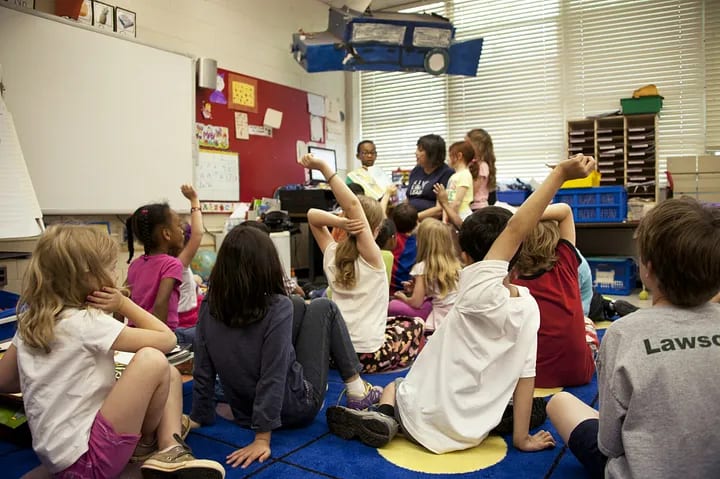This is NOT Education
Rethinking the Education System

“I promise to question everything my leaders tell me. I promise to use my critical faculties. I promise to develop my independence of thought. I promise to educate myself so I can make my own judgements.” Carl Sagan
In a world where education has become synonymous with standardized testing, rote memorization, and a relentless race for grades, my new book, “This is NOT Education,” stands as a clarion call for a radical transformation. Imagine breaking free from the chains of traditional education and embarking on a journey that values intellectual curiosity, critical thinking, and holistic growth over mere credentials. This book is not just a critique; it is a manifesto, a blueprint for an educational renaissance that our society desperately needs.
The Crisis in Education
Picture this: You are a bird, yearning to soar into the vast sky, but find yourself barred in a cage. This metaphor captures the essence of what many students feel within the current educational system. The system is broken, and it is time for a paradigm shift. “This is NOT Education” is my attempt to ignite a conversation about what education should truly embody. It is about transcending the narrow confines of traditional schooling and embracing a broader, more meaningful approach to learning.
In the book, I explore the limitations and inherent flaws of the current educational paradigm. It is a call to action for students, educators, parents, and policymakers to rethink the very foundation of our educational institutions. Education should not be about producing compliant workers; it should be about nurturing thinkers, innovators, and compassionate individuals who are prepared to tackle the complexities of not only the modern world, but the discontents stirring inside of them by the modern world.
At the heart of “This is NOT Education” is a searing critique of the present educational system. Our schools have become factories, churning out graduates who excel at memorizing facts but lack the critical thinking skills and creativity necessary for real-world problem-solving. This book scrutinizes how education has been commodified, reduced to a series of transactions where students are mere consumers and educators are service providers.
We must confront the uncomfortable truth:
our education system prioritizes grades over genuine understanding, competition over collaboration, and conformity over innovation.
“This is NOT Education” challenges these norms and advocates for an educational model that fosters intellectual curiosity and lifelong learning.

The Mental Health Crisis
One of the most alarming discontents of our current education system is its impact on students’ mental health. The relentless pressure to perform, the fear of failure, and the constant comparisons take a severe toll on young minds. In extreme cases, this pressure can lead to anxiety, depression, and even suicide.
“This is NOT Education” provides a comprehensive analysis of the mental health crisis in our schools. The data is staggering: rising rates of anxiety and depression among students, increased incidents of self-harm, and tragically, suicides. In my opinion,
even a single suicide due to the system is a death too many and should be an eye-opener for all of us as a society.
The book includes personal stories of students who have struggled with mental health issues, highlighting the urgent need for systemic change. By addressing the root causes of this crisis, we can create a more supportive and nurturing educational environment.
The Tyranny of Standardization
Standardized testing and a one-size-fits-all curriculum are the hallmarks of our current education system. These tools are designed to measure and compare, but they often fail to capture the diverse talents and learning styles of students. In “This is NOT Education,” I argue that standardization stifles creativity, discourages critical thinking, and produces graduates who are ill-equipped to navigate the complexities of the real world.
The book ventures into the historical context of standardized testing, revealing how it emerged from a desire to quantify learning and predict future success. However, this approach has led to a homogenized education system that values conformity over individuality. By emphasizing standardized testing, we have neglected the unique strengths and interests of each student.

Beyond the Classroom
Education should not be confined to the walls of a classroom or the years spent in formal schooling. It is a lifelong journey, an ongoing process of learning, unlearning, and relearning. “This is NOT Education” emphasizes the importance of cultivating a mindset of continuous growth and intellectual curiosity. This perspective shifts the focus from short-term achievements to long-term development and fulfillment.
In this book, I explore various models of lifelong learning, including informal education, experiential learning, and self-directed study. By embracing these alternative approaches, we can create a more dynamic and inclusive educational landscape that encourages individuals to pursue their passions and interests throughout their lives.
The Role of Teachers
In reimagining education, we must also reconsider the role of teachers. They should be guides and mentors, facilitating the learning process rather than merely imparting information. A great teacher inspires students to think for themselves, to question assumptions, and to seek knowledge beyond textbooks.
“This is NOT Education” highlights the stories of transformative educators who have embraced innovative teaching methods. These educators understand that their role is not to fill students’ minds with facts but to ignite a passion for learning. By fostering a supportive and stimulating environment, teachers can help students develop the skills and confidence to become independent thinkers.
True education happens through dialogue and inquiry. It is not about passively absorbing information but actively engaging with ideas and concepts. Socratic questioning, critical discussions, and collaborative projects are essential components of an educational experience that fosters deep understanding and intellectual growth.
In the book, I discuss the benefits of the Socratic method, an approach where teachers engage with students for encouraging them to question, debate, and explore ideas in a structured yet open-ended manner, rather than authoritatively controlling them. This method promotes critical thinking, self-reflection, and a deeper appreciation for the complexities of the world. By fostering a culture of inquiry, we can create a more vibrant and intellectually stimulating educational environment.

An Interdisciplinary Approach
In “This is NOT Education,” I also make the case for an interdisciplinary approach to learning. Knowledge is not compartmentalized; it is interconnected. Students should be encouraged to explore the intersections between different fields of study, to see the world from multiple perspectives, and to understand the complex relationships that shape our reality.
The book presents examples of successful interdisciplinary programs and projects that have enriched students’ learning experiences. By breaking down the barriers between subjects, we can foster a more holistic and integrated understanding of the world. This approach not only enhances academic achievement but also prepares students to tackle real-world problems that require multifaceted solutions.
Nurturing Moral Growth
Education is not just about intellectual development; it is also about moral and ethical growth. It should nurture empathy, compassion, and a sense of responsibility towards others and the world. “This is NOT Education” discusses the importance of integrating ethical considerations into the curriculum, helping students develop a moral compass that will guide them in their personal and professional lives.
I explore various ethical frameworks and how they can be incorporated into educational practices. By fostering ethical awareness and moral reasoning, we can cultivate a generation of conscientious individuals who are committed to making a positive impact on society.
Redefining Success
One of the most critical aspects of rethinking education is changing our attitude towards failure. In the current system, failure is stigmatized and feared. However, failure is an essential part of the learning process. It teaches resilience, perseverance, and the ability to learn from mistakes. “This is NOT Education” emphasizes the importance of creating a safe environment where students can take risks, experiment, and grow from their failures.
The book includes stories of individuals who have experienced failure and used it as a steppingstone to success. By redefining failure as a natural and valuable part of learning, we can empower students to take bold risks and pursue their passions without fear of judgment or punishment.

A Vision for Transformation
What does the future of education look like? In the concluding chapters of “This is NOT Education,” I present a vision for a transformative educational system. This vision includes personalized learning paths, experiential learning opportunities, and the integration of technology in ways that enhance rather than detract from the human experience.
The book explores innovative educational models and technologies that have the potential to revolutionize the way we learn. From personalized learning algorithms to virtual reality classrooms, these advancements can create more engaging and effective learning experiences. However, I also caution against the pitfalls of over-reliance on technology and emphasize the need for a balanced approach that prioritizes human connections and holistic development.
Structure of the Book: A Guided Journey
“This is NOT Education” is meticulously structured to guide readers through a comprehensive exploration of the philosophy and practice of education. The book is divided into three main parts:
The Philosophical Foundations of Education: his section lays the groundwork for understanding the deeper purpose of education. It explores philosophical perspectives on learning, the importance of critical thinking and the role of education in fostering a holistic understanding of the human experience.
Discontents of the Current Education System: This part provides a detailed critique of the present educational system, highlighting its flaws and limitations. It examines the historical context, the rise of standardized testing, and the commodification of education. It also includes a comprehensive analysis of the mental health crisis, presenting factual data and personal testimonies to underscore the urgent need for reform.
A Pathway to Transformation: The final section looks ahead to the future of education, envisioning a system that embraces personalized learning, experiential education, and the thoughtful integration of technology. It offers practical recommendations for educators, policymakers, and learners, emphasizing the importance of continuous growth, ethical considerations, and the acceptance of failure as part of the learning process.

The Rationale Behind “This is NOT Education”
The impetus for writing “This is NOT Education” stems from my personal experiences and observations as a student, educator, and lifelong learner. I have witnessed firsthand the shortcomings of traditional education and felt the profound impact of alternative learning experiences. This book is a culmination of my reflections, research, and aspirations for a better educational system.
The rationale behind the book is to spark a conversation about the true purpose of education. It is an invitation to question, to challenge, and to imagine new possibilities. Education should not be about producing compliant workers but about nurturing thinkers, innovators, and compassionate individuals who are prepared not only to tackle the complexities of the modern world but become content human beings.
Why You Should Read “This is NOT Education”
“This is NOT Education” is not just a book; it is a movement. It challenges readers to question their assumptions, to engage in meaningful discussions, and to take an active role in shaping the future of education. Whether you are a student, a teacher, a parent, or a policymaker, this book offers valuable insights and practical ideas for creating an educational system that truly nurtures the potential of every individual.
By reading “This is NOT Education,” you will gain a deeper understanding of the flaws in our current educational system and be inspired to think creatively about how we can transform it. You will be equipped with the knowledge and tools to advocate for change, to support innovative educational practices, and to contribute to a more enlightened and equitable society.
A Journey of Transformation
Education is a journey of transformation, both for individuals and for society as a whole. “This is NOT Education” invites you to embark on this journey, to explore new possibilities, and to be part of a movement that seeks to redefine what it means to be educated. Let us move beyond the narrow confines of traditional education and embrace a vision of learning that is rich, diverse, and profoundly human.
In the words of Carl Sagan, “Somewhere, something incredible is waiting to be known.”
Let us embark on this journey together, with open minds and hearts, ready to discover the incredible.
About the Creator
Enjoyed the story? Support the Creator.
Subscribe for free to receive all their stories in your feed. You could also pledge your support or give them a one-off tip, letting them know you appreciate their work.





Comments
There are no comments for this story
Be the first to respond and start the conversation.